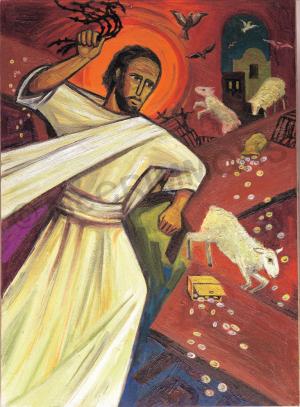
You're different; I'm different; we're all different. But there's a special difference that's supposed to characterize people of faith. The lessons can be found in the Ten Commandments, and further learning occurs with Jesus's Temple cleansing.
Our differences help to define us and form our identity. We may find ourselves with others who share similarities, and we may find ourselves intimidated by others whose dissimilarities from ourselves (and people like us) are quite substantial. We may even have fear generated by the gulf of differentiation between sisters and brothers of the same God.
Differences produce identity. As God has spent time with God's people following the Exodus, God has learned that these people are a troublesome lot. They desperately need some direction. God gives them a "top ten list" which we call the Ten Commandments.
If we spend some time considering what these items are all about - rather than trying to memorize them (please don't; learn about them instead) - then we find the message focusing on the same theme in the first several. They insist that the faithful remain focused on God and what God wants, and not to try any nonsense like fashioning God into your preferred image, or pretending that God can manipulated to serve your narrow ends.
Then there are the minimal social behaviors expected. These are characteristics that follow from the first several, indicating how God's faithful people are to reflect God's desires and God's behaviors toward them in their interactions with others. God's people should be different from those who are not in covenant with God, governing themselves with different standards, sacred standards.
Then there's the story of the cleansing of the Temple by Jesus in John 2, an event that happens early in John's gospel compared to the synoptic gospels which have it occurring during Holy Week at the end of Jesus' ministry. Here we see a perfect reflection of what NOT to do from the commandments.
Jesus flies into a rage as he storms through the marketplace, declaring that such activity has no place in the presence of God. Of course, everything happening in the marketplace was occurring thanks to the presence of the Temple, making it a source of corruption rather than holiness.
The Temple authorities challenge Jesus' authority to act in such a manner. Jesus tries to get them to understand what's wrong, but they're inured against any sense of wrongdoing. Jesus tries to get them to see the need to be different, but they cannot hear what he's saying.
Find out what it means to be different as a person of faith as you watch the sermon video and sample the downloads below the video panel.
Our differences help to define us and form our identity. We may find ourselves with others who share similarities, and we may find ourselves intimidated by others whose dissimilarities from ourselves (and people like us) are quite substantial. We may even have fear generated by the gulf of differentiation between sisters and brothers of the same God.
Differences produce identity. As God has spent time with God's people following the Exodus, God has learned that these people are a troublesome lot. They desperately need some direction. God gives them a "top ten list" which we call the Ten Commandments.
If we spend some time considering what these items are all about - rather than trying to memorize them (please don't; learn about them instead) - then we find the message focusing on the same theme in the first several. They insist that the faithful remain focused on God and what God wants, and not to try any nonsense like fashioning God into your preferred image, or pretending that God can manipulated to serve your narrow ends.
Then there are the minimal social behaviors expected. These are characteristics that follow from the first several, indicating how God's faithful people are to reflect God's desires and God's behaviors toward them in their interactions with others. God's people should be different from those who are not in covenant with God, governing themselves with different standards, sacred standards.
Then there's the story of the cleansing of the Temple by Jesus in John 2, an event that happens early in John's gospel compared to the synoptic gospels which have it occurring during Holy Week at the end of Jesus' ministry. Here we see a perfect reflection of what NOT to do from the commandments.
Jesus flies into a rage as he storms through the marketplace, declaring that such activity has no place in the presence of God. Of course, everything happening in the marketplace was occurring thanks to the presence of the Temple, making it a source of corruption rather than holiness.
The Temple authorities challenge Jesus' authority to act in such a manner. Jesus tries to get them to understand what's wrong, but they're inured against any sense of wrongdoing. Jesus tries to get them to see the need to be different, but they cannot hear what he's saying.
Find out what it means to be different as a person of faith as you watch the sermon video and sample the downloads below the video panel.
| 03-04-18-ff-answers.pdf |
| 03-04-18-thou_shalt_be_different.pdf |
